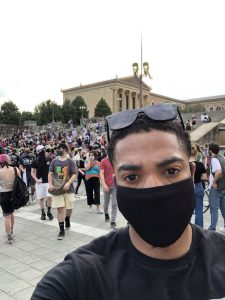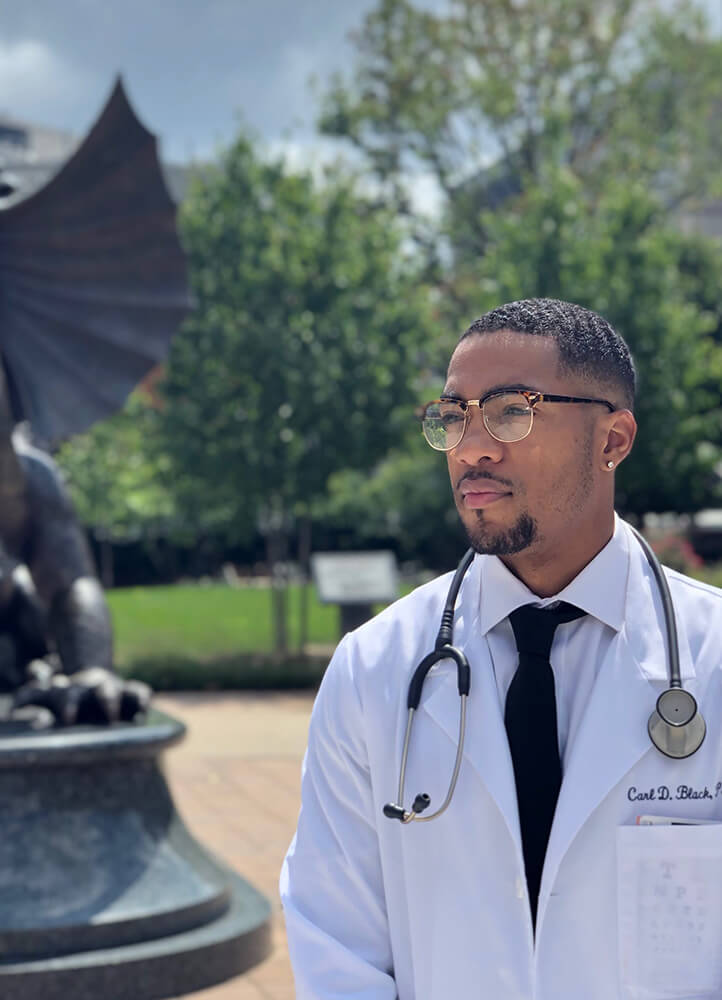Like tens of thousands of his fellow Philadelphians, Carl Black took to the streets of his hometown following the violent death of George Floyd in late May.
A young Physician Assistant (PA) studying at Drexel University, Black, who plans to direct commission as a United States Army medical officer next year, would see his old National Guard unit stationed at his place of study.
Brought in to control the anti-racism protests that had sprung up, they were little used. Instead, as the Black Lives Matter movement made its voice heard, Black says he saw his city join as one to recognize the need for change.
“I can not remember feeling this much unity in this city, or anywhere for that matter,” he says.
“There were white, Black, Indian, Asian, Hispanic—you name it—all down there, side-by-side, for the same reason. I say it to all my friends, I would do the same if this was happening in your home. When you hurt, I hurt.
“There’s no one leader with this movement here – we all have equal voices. We’re finally using the powers of social media for good. We are all actively a part of this movement, or, at least, have the opportunity to be.”
“When we talk about the voice that minorities have in the community of medicine, it’s a huge voice. The problem is it is often not heard. This is where social media can come in.”
Beyond his contributions as a PA, and future medical officer in the U.S. Army, Black is certainly using his personal voice to great effect, as part of the new podcast, The Minority Rapport Movement (@minority.rapport.movement).
Alongside Carlos Cano (who is Mexican-American), Sato Ikeda, (born in Japan, and raised in Ireland), and Aaron Hunro, (Cambodian-American), Black is one of four Philadelphia PAs who, on a weekly basis, will discuss the challenges minorities face in medicine, and how to overcome them.
Conceived two months ago and available on iTunes, Spotify and YouTube, the podcast’s third episode will be released this weekend, featuring two LGBT PAs from California serving as special guests. Despite their obvious focus, Black says the four hosts want it to serve as an educational platform for everyone.
“When we talk about the voice that minorities have in the community of medicine, it’s a huge voice,” he says. “The problem is it is often not heard. This is where social media can come in.”
“We wanted to have as many different perspectives as possible by having people with four different backgrounds. Moving forward, we want any and everybody who wants to participate there with similar goals to further educate and promote diversity.”
A journey into medicine
Black grew up in the urban part of Northeast Philadelphia in Frankford, historically a deeply segregated neighborhood. Despite his father working with cars and his mother being a certified nursing assistant (CNA), Black didn’t originally intend to get involved in medicine. A strong work ethic was instilled early on, though.
“I learnt the values of hard work, street smarts and respect,” he says. “I’d say, for the most part, I was a good kid growing up in a class of lower middle income, though in my neighborhood, it’s pretty easy to get caught up in the streets when you’re young.
“I’ve seen close friends murdered and incarcerated doing a lot of time. I realized that this wasn’t the life that I had envisioned for myself.”
Black studied at community college after leaving school, before moving to Penn State where he completed his initial studies in nanotechnology and engineering.
In 2017, he’d go on to graduate at Temple University with a BSc in biology and psychology, before moving to Drexel to study as a PA. He is due to finish his program this December.
Recent years have seen Black’s medical trajectory twinned with a burgeoning military career that can trace its roots to viewing the 9/11 terrorist attacks on television as a young teenager.
As he pursued his medical career, he signed up as a U.S. Army combat medic. He completed his basic training in Missouri, before doing his medical training at Fort Sam Houston in San Antonio (where he volunteered with the Wounded Warrior Project).
Recently serving six years enlisted in the Pennsylvania National Guard’s 28th Infantry Division, Black plans to direct commission as an officer after completing PA school, later this year.
“In the military, you learn a lot of core values,” he says, of how the military’s skill-sets complement medicine.
“You learn a lot of discipline, a lot about yourself, what you can take, and what you can handle. You understand the severity of a lot of situations. A lot of these things transfer over to medicine very well. Military and medicine kind of go together like peanut butter and jelly.”

‘I felt isolated, essentially’
Recently, NPR reported on med students describing ‘widespread racism, hazing and other abuse’ in medical education, while noting that research, published in JAMA Internal Medicine in January, showed minority students were more likely to face “discriminatory comments, public humiliation, and inappropriate sexual advances” during training.
Between 2016 and 2017, the study reported that 38 percent of minority students reported mistreatment while studying, compared to 24 percent of their white peers.
“If these small disadvantages accrue throughout medical school, it could be contributing to keeping certain populations out of medicine,” Katherine Hill, the study’s main author, told NPR.
“Discriminatory comments can have a negative impact—both on the people who are targeted, and on bystanders.”
Sometimes the only Black male in his classes, Black says he faced micro-aggressions, and a different general kind of attention while studying.
“I felt isolated, essentially,” he says. “I would have people just looking at me and asking me certain questions. It’s not racist, but it’s implicit bias.
“You know, ‘you’re smart; you’re smart for a black man.’ You would think that’s a compliment, but in reality you’re saying ‘you’re smart for a black man.’ What does that mean, for a black man? Does it mean we don’t have to capability of being smart?
“When you add that extra part, it takes away from what your intent might have been, even if you had no ill intent. I did feel a little judged by my peers, and even my friends.”
“If these small disadvantages accrue throughout medical school, it could be contributing to keeping certain populations out of medicine … discriminatory comments can have a negative impact—both on the people who are targeted, and on bystanders.”
“It’s a weird thing to explain,” Black continues. “It’s just uncomfortable, and still is to this day, to be honest.”
“People look at me and they don’t expect me to know what I know, as far as medicine or whatever the case may be.
“They might look at me like I’m security or part of the environmental services, people who help clean up and that nature, because that’s where you mostly see black people [at the hospital]. I respect those workers of course but some people rarely care to really get to know us sometimes before judging.”
Black says he felt a different kind of isolation from his own community, as he progressed through his medical education.
“There was a point at the beginning when people were pretty much making fun of you if you went to school,” he says.
“That wasn’t the cool thing to do in the community. The community cool thing to do was sell drugs, play sports and rap. Indirectly, it made you think ‘am I supposed to be doing this?’, ‘what am I really wanting to go to school for?’ and ‘what is the end goal?”
Hope for change
Black is hopeful that the energy for change that he felt on the streets of Philadelphia will spread to the medical industry, over time. Indeed, the White Coats for Black Lives demonstrations show the energy is certainly there.
“The movement is around the world,” he says. “That shows how much unity, and how much further we have progressed.
“When we talk about the Civil Rights movement and how powerful that was, it was really just local [to the United States], and that had a huge impact, B.L.M. is global now.”
“You’re always going to get resistance, but I think those numbers are decreasing,” he adds
“In the medical profession, people come in from all different walks of life,” Black adds. “[The medical professional] has to be able to check their implicit bias – it’s not about you.
“It’s about them, the patient. It’s about meeting the patient where they are. Then you’ll be able to treat them, and help them get better.”



